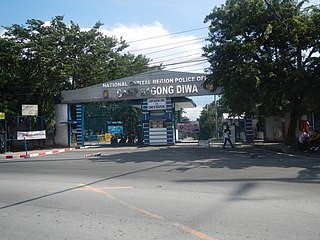
The Chiong murder case was a trial regarding an incident on July 16, 1997, in Cebu City, in which sisters Marijoy and Jacqueline Chiong were kidnapped, raped, and murdered.

Ferdinand Hipolito Navarro, known professionally as Vhong Navarro, is a Filipino comedian, actor, dancer, recording artist and television host. He is known for his iconic comedic roles in Agent X44, Mr. Suave, and Spider-Man parody film Gagamboy. He is a regular host on ABS-CBN's noontime variety show It's Showtime. He was also part of the dance group Streetboys alongside fellow It's Showtime host Jhong Hilario.

The New Bilibid Prison (NBP) in Muntinlupa, Metro Manila is the main insular prison designed to house the prison population of the Philippines. It is maintained by the Bureau of Corrections (BuCor) under the Department of Justice (DOJ). As of October 2022, the NBP housed 29,204 inmates, nearly five times its intended capacity of 6,345.
CPDRC Dancing Inmates or the CPDRC dancers is a collective of prison inmates in Cebu Provincial Detention and Rehabilitation Center (CPDRC), a maximum security prison in Cebu, in Cebu Province, Philippines where the prisoners perform dance routines as part of their daily exercise and rehabilitation, and many of their performances are filmed and released online, making them a popular feature among fans and veritable online celebrities.
Ynfane Avanica, known professionally as Ana Capri, is a Filipino actress.

The Philippine National Police, Philippine Drug Enforcement Agency, National Bureau of Investigation led by Justice secretary Leila de Lima launched a series of raids on the New Bilibid Prison on December 15, 19, and 22, 2014, targeting drug lords allegedly operating inside the prison and to seize contraband reportedly in possession of some of the prison's inmates. Prohibited items such as methamphetamine chloride and other drug paraphernalia, inflatable sex dolls, a stripper bar and jacuzzi were found in air-conditioned villas of high-profile inmates. Police also found other contraband in the prison, such as firearms and bladed weapons, mobile phones, flat-screen TVs, laptops, WIFi, luxury Patek Philippe, Cartier, and Rolex watches, a sauna, and over ₱2 million in cash from body searches of several inmates.

On August 13, 1989, 16 inmates at the Davao Metropolitan District Command Center, who had previously escaped from the Davao Penal Colony, captured 15 members of a Protestant group, the Joyful Assembly of God. The inmates were part of the prison gang called the Wild Boys of DaPeCol, led by Felipe Pugoy and Mohammad Nazir Samparani. The hostage crisis ended with the deaths of five hostages and all 16 inmates.

The New Bilibid Prison drug trafficking scandal is a criminal investigation and political scandal concerning allegations of government involvement in illegal drug trade at the New Bilibid Prison in Muntinlupa, Metro Manila, Philippines. The allegations were made by President Rodrigo Duterte after announcing that the two top convicted drug lords in the country continued to run their drug rings from inside the national penitentiary with former administration officials and their local government cohorts as co-conspirators. On August 25, 2016, Duterte released a drug matrix showing the structure of drug trafficking operations at the New Bilibid Prison and identified the two former top officials of the Department of Justice, the former provincial governor and board member of Pangasinan, and the former Bureau of Corrections director as being involved in the Bilibid narcotics trade.

Jaybee Niño Manicad Sebastian was a Filipino high-profile inmate interned at the New Bilibid Prison (NBP) who was convicted for kidnap-for-ransom and carnapping in 2009. He was known for running a prison gang and was allegedly involved in the illegal drug trade within the prison.
Quezon City Jail is located in Quezon City northeast of Manila, Philippines, in the National Capital Region (NCR). It reports to the Bureau of Jail Management and Penology (BJMP). The prison was built in 1953 for 800 inmates but has since held 3,800 prisoners.
On April 27, 2017, a scandal arose when a team from the Commission of Human Rights (CHR) raided the Manila Police District (MPD) station 1 in Tondo, Manila, Philippines and discovered that about 12 men and women were being detained inside a cell hidden behind a bookshelf. It was reported that these prisoners inside the said cell were being held by the police allegedly to be released only upon payment of ransom.

The good conduct time allowance (GCTA) controversy started in August 2019 involving the employees of the Bureau of Corrections (BuCor). It begins with Bureau of Corrections Director General Nicanor Faeldon and several other government officials signing the document containing the release of former Calauan, Laguna Mayor Antonio Sanchez, the prime suspect in the rape and murder of Eileen Sarmenta and her friend Allan Gomez in 1993, and the release of Josman Aznar, Ariel Balansag, Alberto Caño and James Anthony Uy, the 4 suspects in the rape and murder of sisters Marijoy and Jacqueline Chiong in 1997, citing "good conduct."
2020 in the Philippines details events of note that have occurred in the Philippines in 2020.

The COVID-19 pandemic in the Philippines was a part of the worldwide pandemic of coronavirus disease 2019 caused by severe acute respiratory syndrome coronavirus 2. As of December 11, 2024, there have been 4,173,631 reported cases, and 66,864 reported deaths, the fifth highest in Southeast Asia, behind Vietnam, Indonesia, Malaysia, and Thailand. The first case in the Philippines was identified on January 30, 2020, and involved a 38-year-old Chinese woman who was confined at San Lazaro Hospital in Metro Manila. On February 1, 2020, a posthumous test result from a 44-year-old Chinese man turned out positive for the virus, making the Philippines the first country outside China to record a confirmed death from the disease.

The COVID-19 pandemic has impacted prisons globally. There have been outbreaks of COVID-19 reported in prisons and jails around the world, with the housing density and population turnover of many prisons contributing to an increased risk of contracting the virus compared to the general population. Prison crowding and lack of sanitation measures contribute to the risk of contracting diseases in prisons and jails. As a mitigation measure, several jurisdictions have released prisoners to reduce density and attempt to reduce the spread of the illness. There have also been protests among prisoners, riots and prison breaks in multiple countries in response to prisoner anger over their risk of contracting illness in prison conditions. Before the COVID-19 pandemic, health services within prisons had issues providing adequate care for incarcerated people, and this has only been exacerbated by the impacts of COVID-19. Minority groups within the prison system have been disproportionately affected by the COVID-19 pandemic.

The Bureau of Immigration Bicutan Detention Center (BI–Bicutan) is the principal immigration detention center administered by the Bureau of Immigration of the Philippines. Located inside Camp Bagong Diwa, in Lower Bicutan, Taguig, the facility is known internally as the Warden Facility and Protection Unit (WFPU). However, in press releases and public statements, the Bureau variously refers to the facility as a "jail", "warden facility" or "detention center". The function of the facility is to hold foreign detainees who are awaiting deportation, for example, because they have pending criminal cases, or because they are accused of having overstayed their visas.

Camp Bagong Diwa is the headquarters of the National Capital Region Police Office, located in Lower Bicutan, Taguig, Philippines. It was formerly called as Camp Ricardo Papa in 1999 to early 2000s.
The COVID-19 pandemic in Zamboanga Peninsula is part of the worldwide pandemic of coronavirus disease 2019 caused by severe acute respiratory syndrome coronavirus 2. The virus reached Zamboanga Peninsula, Philippines on March 24, 2020, when the first case of the disease was confirmed in Zamboanga City. All provinces including the cities of Zamboanga and Isabela have recorded at least a single case.
On August 13, 2016, three Chinese nationals detained at the Davao Prison and Penal Farm in Panabo, Davao del Norte was stabbed to death by two Filipino inmates.













